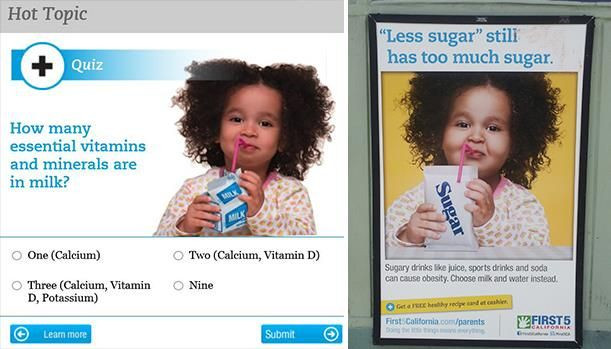First 5 California Anti-Obesity Campaign Digitally Fattens Little Girl To Make A Point

The media is in an uproar after it was revealed that First 5 California's newest public service ad was doctored to make a healthy-sized, milk-drinking child look larger than she actually is in real life. The ad took a healthy little girl and digitally fattened her and replaced her carton of milk with a new drink of choice — a white bag labeled, "sugar."
In addition, organization's new campaign to fight childhood obesity labeled the photo, "Sugary drinks like juice, sports drinks and soda can cause obesity. Choose milk and water instead."
First 5 California is an organization dedicated to improving the lives of California's children and families through education, health services and childcare. The agency's goal is to start a dialogue about healthy eating, primarily within the household for parents to educate themselves and their children.
Marilyn Wann, author of the book and website, "FAT!SO?" Because You Don't Have to Apologize for Your Size," placed the original photo of the little girl found on First 5's website, next to the photoshopped image that appears on posters around California, and circulated them around Facebook and Tumblr social media websites. Once the images went viral, an uproar took over California, criticizing the negativity of the message.
Wann stated along with her photo, "children deserve to be protected from this kind of damaging fearmongering. (And from creepy Photoshopping!)."
First 5 refuses to apologize for Photoshopping to get their message across. The agency has been working on anti-obesity campaigns for years, however this is the first time they used Photoshop to make the children appear larger than they actually are.
According to the Centers for Disease Control and Prevention (CDC), in the past 30 years, childhood obesity has more than doubled in children (ages 6 to 11) and tripled in adolescents (ages 12 to 19). Both children and adolescents who are obese are at greater risk for developing bone and joint problems, sleep apnea, social and psychological problems such as stigmatization, and poor self-esteem. Long-term health effects are startlingly dangerous and life threatening,including the increased likelihood of adult obesity, heart disease, type 2 diabetes, stroke, several different types of cancer, and osteoarthritis.
Obesity can cause damage to virtually every system in child and adolescent bodies, such as the heart and lungs, muscles and bones, kidneys and digestive tract, as well as in hormones that control blood sugar and puberty. Bullying has been at the forefront of many issues arising from elementary to high school and many of them stem from the social and emotional toll obesity is linked to today. According to the Harvard School of Public Health, although obesity rates are currently higher in adults than children, the U.S., Brazil and China, as well as other countries, have seen obesity rate escalate more rapidly in children than adults.
In fact, a study conducted by the American Academy of Pediatrics confirms that children who become obese as early as age two were significantly more likely to be obese as adults.
Defending the campaign was First 5 spokesperson, Lindsay VanLaningham, who told MSN, "It was intended to show parents the real-life consequences of obesity and what sugar can do to our children's lives."
VanLaningham went on to cite that the average four to five year old consumes 17 teaspoons of added sugar a day, which translates to 65 pounds a year and a majority comes from sugary beverages.
According to the CDC, 17 percent (12.5 million) of American children and adolescents are considered obese, and the numbers are only rising. One in seven low-income preschoolers are obese, and the population of the two to four year olds has been steadily rising since 1998. The problems don't get any better at adolescence either. Only one-third of high school students get the recommended amount of exercise, which indicates more than 70 percent of adolescence aren't coming close to achieving the 60 minutes of physical activity each day recommended by the CDC.
"We need to fight obesity... not obese people," childhood obesity prevention researcher, Marsha Davis said.



























